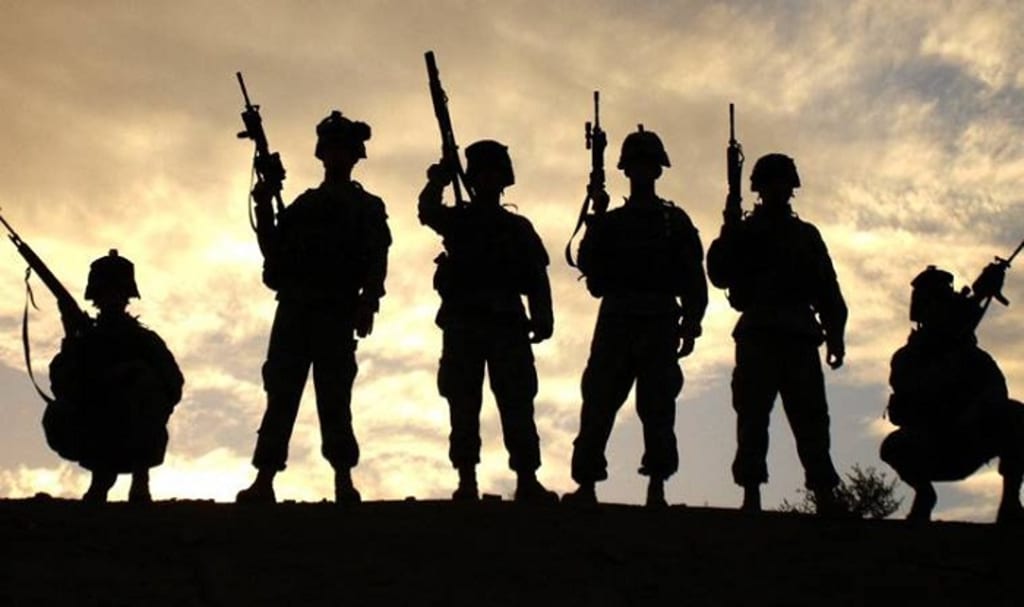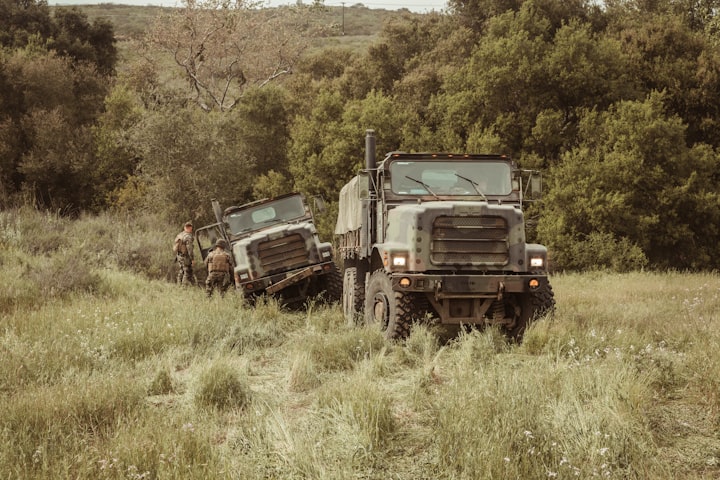5 Things I Wish I Knew Before Joining the Army
My Battles as a Female Soldier

Five things I wish I knew before joining the army:
1. You will encounter a lot of sexism.
Sexism is very much alive and it is in full force while being a female service member! Often times, before my deployment I would use this to my advantage and get out of doing certain physical tasks, which at the time I figured it to be harmless. As time went on, I started noticing that some of my male battles were starting to view me as weaker? Which to me, I found to be completely insane! I can do anything that these men could do, and often times I could even do it better! I would start seeing these men get chosen to be on special op teams that I wanted to be a part in, and in the back of my head I always had a feeling it was due to my sex, but never spoke up. I learned very early on that you need to hold your ground from the beginning, it's much harder for a female to gain respect in the military field (especially being a military police) than it was for a man. It wasn't until we had deployed and my staff sergeant was ONLY putting me in office positions (I am a military police! Not a desk/officer person!) that did I speak up. I told my sergeant I am smarter than these men, more levelheaded and just as capable, IF NOT MORE, than these men you are putting out in the field, I am competent in everything that I do, I want to be doing the job that I trained for! So, after that they started putting me with the rest of my male battle buddies, which I was super excited for! I thought "YES I WON! THEY SEE ME AS A SOLDIER, NOT A FEMALE!" After the momentum of that win went away, it went to the same thing. Granted, I was never put in the office again, but I still wasn't being given the same jobs as the rest of my battles, but I didn't make a fuss about it, didn't want my "female hormones" to bother any of my male counterparts. But then Osama Bin Laden was killed, and our FOB was being rioted and they needed reinforcements from our unit (The rule for our unit was if anyone needed reinforcements, the first five people to our equipment room was the Force Team for that job)! So naturally, I would always make sure I was RIGHT NEXT to this room so when the time came I would be there! The time came! I was the first person in this room and started gearing up for battle! I was so excited! My sergeants and the men in this room were quiet, and looking at each other, then looking at me. Another male was disgusted at the fact that he wasn't on the team because I took HIS place. The rule was set, fair is fair. So finally, I looked at my battle buddies and told them "I went through basic training, JUST LIKE ALL OF YOU. I graduated, went through military police school JUST LIKE YOU. I went through combat training and passed everything with flying colors JUST LIKE YOU. There is NO REASON why I can't do this, I have trained for this. You can NOT tell me NO!" I was just upset! This was so insane! My sergeant just replied " You understand? They want to kill you, its not games in there." I responded "They want to kill us all. It's no different." So they let me go, and the mission went without issue. You encounter a lot of this in the military and you need to stand your ground from early on or it will become who you are. You are a strong soldier and no one's opinion of you can change that. Don't fall into the stereotypes.
2. On deployments, your morality will constantly be challenged.
This had to be one of the hardest parts of deployment (other than being away from your family). When you deploy, you start to see everyone's true colors come out, and it's not always pretty. The normal, everyday society rules does not always apply. You will be put into situations where a lot of times, doing the right thing, will not gain you any friends. At the end of the day you have to go with the decision you are willing to live with. I believe that making a choice that you will feel good about yourself, and have no regrets, is a lot better than making friends for that moment. Sometimes, even your chain in command will be wrong. As long as your following your code of ethics, you need to let everyone's personal opinion of the situation go. They should not be a factor is determining who you truly are. You can't go wrong.
3. Often times, the hardest part of a deployment is the reintegration process.
This was most definitely true for me. When I came home, I expected things to go back to how it was when I left. To me, it felt like my world at home STOPPED, and I would come back, and it would START again. To my dismay, my world at home DID NOT stop. My family and friends kept on living, changing. Some friends and family died during my deployment. My long time love interest wasn't there anymore, he moved onto another relationship (It wasn't fair of me to pursue that relationship while I was going to be away anyhow). Things were just DIFFERENT! My family learned to live without me and they were already set in their ways, so when I came back it was almost a burden for them to change their life again. Then, I became angry. I couldn't handle this change. I drank. I drank a lot. The mixture of trying to reintegrate and FAILING and having all the saved up deployment money, turned out to be disastrous for me. This turned into the homeless and the couch-surfing portion of my life, which will be covered more in the next section of this piece. The military does offer a lot of programs at the end of the deployment to help prevent these cases. Only issue is that the majority of our service men and women are younger and don't take it as seriously as they should. When the information is being given, it's often RIGHT when you come back from your deployment and it's BEFORE you even realize there is a problem. Soak up every bit of information these people have to give to you. It could very well save your life one day.
4. Mental health is poorly managed.
We see it/hear it all the time. Disturbed veteran shoots up blah blah blah. During wartime, just about ANYONE will be accepted into the military, a lot of things are overlooked. A lot of people who SHOULD NEVER hold a gun or be in the military, end up being service members. We can go on and on about how mental illnesses are brought into the military, but what I really want to focus on is how mental illnesses are HANDLED after a deployment. The majority of my unit, including myself, were diagnosed with severe anxiety disorders and depression. Deployment really takes a lot out of you. Most of us were on some heavy medications to help cope with it. During our processing out phase, they separated the people who were having mental health issues to go and speak to a therapist (Issue #1: Military is predominantly men. They have a macho-ism way of thinking. I strongly believe that there were many men who never sought help because they thought it was "weak" but they really needed it. Instead of singling out the people who DID seek for help, they should have examined EVERYONE). So we go and speak to our therapist via Skype (rolls eyes) and we spent probably around 5-10 minutes to talk about my experience in Afghanistan via 'yes or no' questions. "Did you experiences this? "Did you experience that?" (Issue #2: Dude! I have on my MEDICAL RECORDS that I developed depression and a severe anxiety disorder that I am taking meds for! ASK ME WHAT I AM FEELING! If there were ANY RED FLAGS, how could they EVER have found out through our 5-10 minute Skype session? Luckily for the public, I am not a threat to society because this could have ended differently). So after that session I joined the rest of my comrades and joked about how much of a JOKE that whole process was. It was SO funny! We thought it was. It wasn't until several months later did I realize I actually couldn't cope with reintegrating, I couldn't cope with my depression and anger over everything did I realize I needed serious help. I ended up leaving my home, living out of my car/motel for several months and things were just not getting better for me. I called the 'ever so lovely' VA to try to get help, but they ended up telling me they couldn't help me without me paying them money for it. (Issue #3: I JUST told these people I was homeless, I had NO SPARE money to give. I had JUST come from deployment and I am NOT OK, I NEEDED HELP. I was SCREAMING for help, and got none and they insisted I needed to pay to get help. This was just absurd to me). Another several months of that went by, a couple more attempts to get help came by and failed. This disastrous downward spiral led to me overdosing on a bottle of pills and landed me straight into the hospital. Into the LOVELY VA that I tried to get help MULTIPLE TIMES FOR. I had to almost DIE to get them to notice me, what was this madness!? I told this to one of their doctors, representatives? I have no idea who he was, but I will always remember his response. I asked him, "Why didn't you guys help when I was calling over and over?" He told me "Soldiers sometimes fall through the cracks." I will never forget that. To make this story worse, after I left, I showed up to NO meetings, NO therapy sessions that I had agreed I would do, within a couple weeks of not following my promises, I get a letter in the mail saying I am CLEARED TO CARRY MY WEAPONS. :O!!!! Luckily for the public, I am NOT a threat to society, and luckily for all of us the military is starting to crack down on situations like this after certain events had to happen, slowly but surely they will get it. Mental health needs to be seriously monitored, for the sake of all of us. It's up to you to know when you have reached your limit, everyone's limit is different. Two people can go through the same scenario but they react differently to that same scenario, don't compare yourself to others. Just because one person is able to cope with a scenario and you need a little help, doesn't make you one bit out of the ordinary. When you're sick, you go to the doctors, you get help. Managing your mental health is nothing to be ashamed of, and its NOTHING to feel weak about. If anything, the ability to be able to express your feelings and know when you need help is a strength.
5. Your family/friends who are not service members, won't understand.
Its not their fault, they don't get it. No matter how hard they try, you can't expect them to get it. Your best friends will be your battle buddies, the ones you experienced this all with. They may live in different states from you or are far away, but these are the people who need to be able to lean to because they GET IT. Coming back, I avoided my battle buddies like the plague. I had enough of them, but when I needed to talk through some events that happened, or just talk some military lingo, they get it. They will be some of the best friends you will ever have, don't lose contact with them.
The point in this article is not to downplay the decision of joining the military. I am very proud of my service and anyone who put their lives at risk for the sake of our country has earned my respect. When I was 18 years old and decided to join, the only thing I thought about was how amazing it is and glorifying it was. Which, again, it is an amazing decision, but there is also a negative to every positive. For me, my major negative was the mental health aspect of it, I would tell my 18-year-old self that staying on top of my mental health is not anything to be ashamed of. For another soldier, there may be another negative that will be glaring to them. Whatever your personal battle may be, you can overcome it. You are a soldier and you got this!






Comments
There are no comments for this story
Be the first to respond and start the conversation.